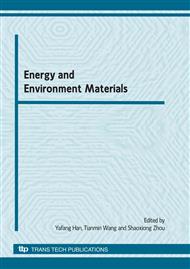p.320
p.324
p.330
p.336
p.343
p.347
p.355
p.361
p.367
The Influence of Degree of Polymerization on Precursor-Derived Si-B-C-N Ceramics
Abstract:
Precursor derived Si-B-C-N ceramic is a kind of amorphous materials with high hardness, low density, durability at extremely high temperature. The materials show a great potential to be used in the field of the Thermal Protective System (TPS). The physical states and chemical properties of the amorphous materials greatly depend on the starting materials. The effect of degree of polymerization (DP) of the precursor on the pyrolysis process and the characteristics of the amorphous Si-B-C-N materials are studied. The SiBCN-based preceramic polymer synthesized by dichloromethylvinylsilane, ammonia and BH3•SMe2. Dichloromethylvinylsilane reacted with ammonia and BH3•SMe2 in toluene or tetrahydrofuran (THF) as solvent in the presence of catalytic amounts of pyridine. The polymeric precursors were cured at low temperature to obtain solid-state precursors. Pyrolysis process of the solid-state precursors under various temperatures and carried out in nitrogen atmosphere. The results showed that DP of the precursor influences the pyrolysis process and the high temperature stability of the Si-B-C-N amorphous ceramics.
Info:
Periodical:
Pages:
355-360
DOI:
Citation:
Online since:
May 2010
Authors:
Price:
Сopyright:
© 2010 Trans Tech Publications Ltd. All Rights Reserved
Share:
Citation:


